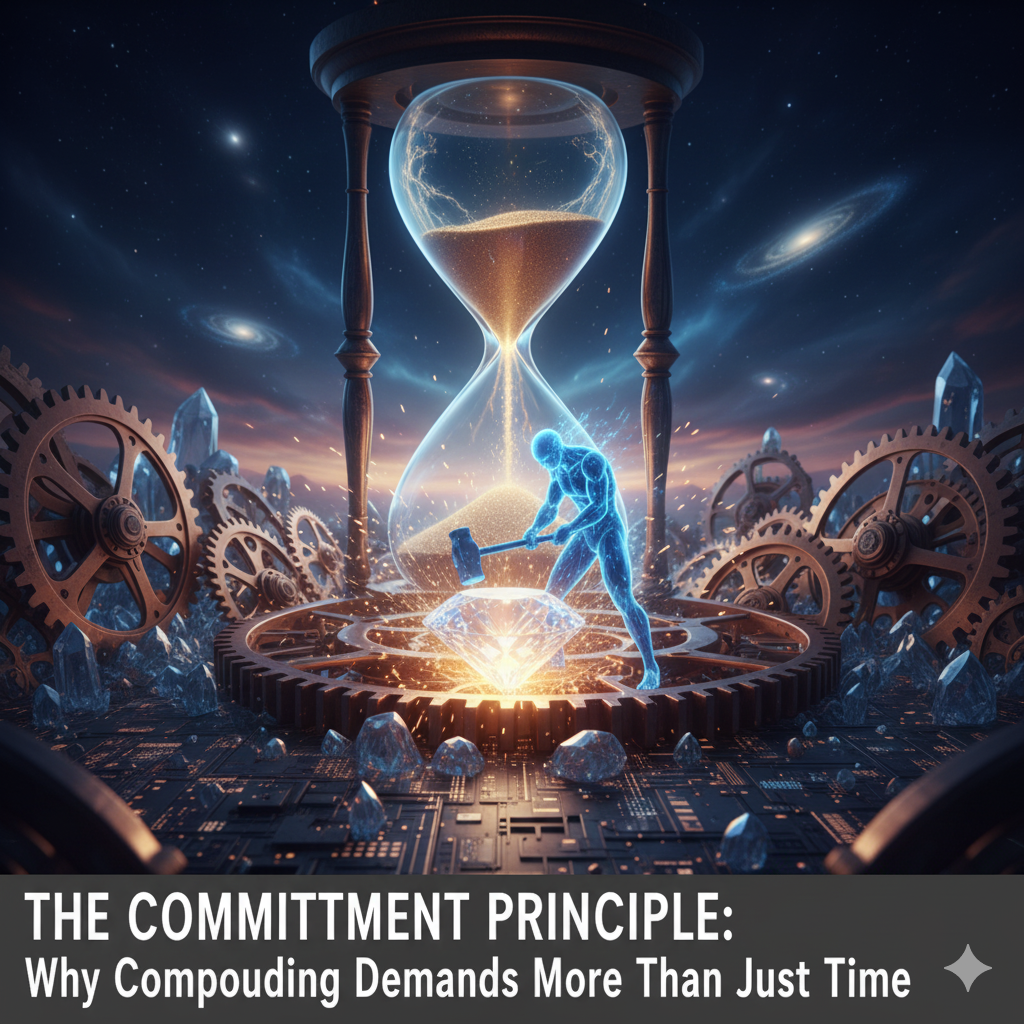We talk about compounding like it’s passive magic. Invest your money, wait forty years, and watch it multiply sevenfold. Learn a skill, practice daily, and eventually become world-class. Build relationships consistently, and they’ll deepen into something irreplaceable.
All true. But there’s a critical element we gloss over: compounding doesn’t just require time. It requires commitment.
The Compound Interest Trap
Einstein allegedly called compound interest the eighth wonder of the world, but he left out an important detail. Compound interest only works if you leave the money alone. Every withdrawal resets the clock. Every panic sale during a downturn erases years of exponential growth. The math is elegant, but the psychology is brutal.The investor who puts $10,000 in an index fund and checks it obsessively will likely underperform the one who sets it and forgets it. Not because they have different returns on paper, but because the obsessive checker will inevitably sell during the next crash, missing the recovery that creates most of the gains.The commitment isn’t to make the initial investment. It’s to not touch it when every instinct screams that you should.
Skills Compound Only With Consistency
Learning compounds similarly. The difference between someone who’s mediocre and someone who’s exceptional at guitar isn’t usually talent. It’s that the exceptional player committed to showing up for ten thousand hours, even on days when practice felt pointless.But here’s what makes this hard: compounding in skill development is invisible for a long time. You practice scales for months and still sound terrible. You study a language for a year and still can’t watch a movie without subtitles. You write every morning for six months and your prose still feels clunky.The commitment required isn’t just to practice. It’s to keep practicing when you see no evidence it’s working. Most people quit right before the curve bends upward.
Relationships Need Protected Space
Compounding in relationships might be the hardest of all, because it requires mutual commitment. A friendship doesn’t deepen because you’ve known someone for twenty years. It deepens because you’ve both committed to showing up for twenty years.This means saying no to other things. Declining social invitations because you already have plans with your family. Turning down job opportunities that would require relocating away from your closest friends. Staying in difficult conversations instead of ghosting when things get awkward.Every relationship that compounds does so because someone made the commitment to prioritize it over other options, repeatedly, over time.
The Paradox of Options
Here’s the uncomfortable truth about modern life: we’ve optimized for optionality at the expense of compounding. We keep our schedules flexible, our investments liquid, our career paths open. We’re terrified of closing doors.
But compounding requires closing doors. You can’t compound returns in ten different investment strategies at once with limited capital. You can’t become world-class at five different skills simultaneously. You can’t build deep relationships with a hundred people.The commitment that enables compounding is fundamentally a commitment to say no. To let opportunities pass. To accept that choosing one path means abandoning others.
Making Commitments Stick
So how do you actually make commitments that allow compounding to work?
First, accept that commitment feels like loss. You’re not just choosing what to do; you’re choosing what not to do. The FOMO never fully goes away. Make peace with it.
Second, use friction strategically. Automatic transfers to retirement accounts work because they remove the daily decision. Deleting social media from your phone helps writing compound because you’ve eliminated the easy distraction. Scheduling recurring dinners with friends compounds relationships because you’ve removed the friction of coordination.Third, remember that commitment isn’t the same as rigidity. You can change direction, but you need to commit to the current direction long enough to see if compounding kicks in. Six months isn’t enough. Six years might be.
The Real Magic
Compounding is magical, but the magic isn’t in the mathematics. The magic is in what happens to people who commit. They develop confidence that comes from seeing something through. They build judgment that only emerges from extended exposure to a domain. They form identities around the things they’ve stuck with long enough to get good at.The returns compound, yes. But so does the person.Time in the market beats timing the market, as the saying goes. But actually staying in the market when it crashes requires something deeper than patience. It requires commitment.
And commitment is the price of admission to compounding’s exponential returns.
